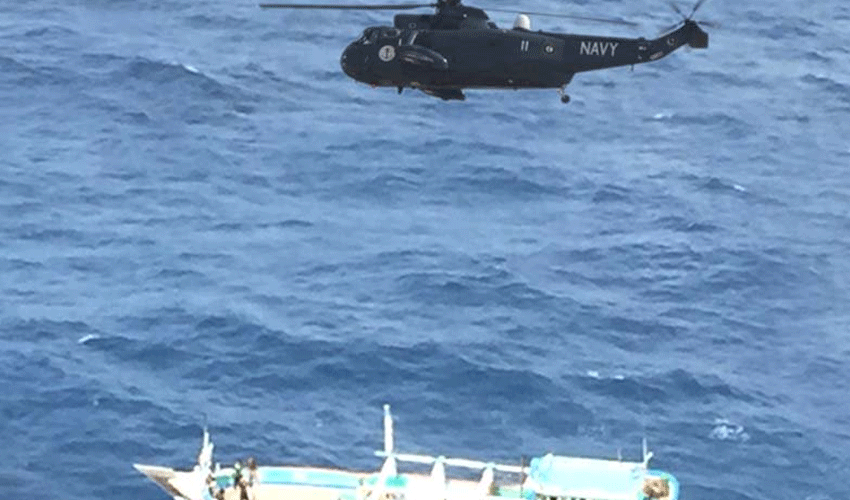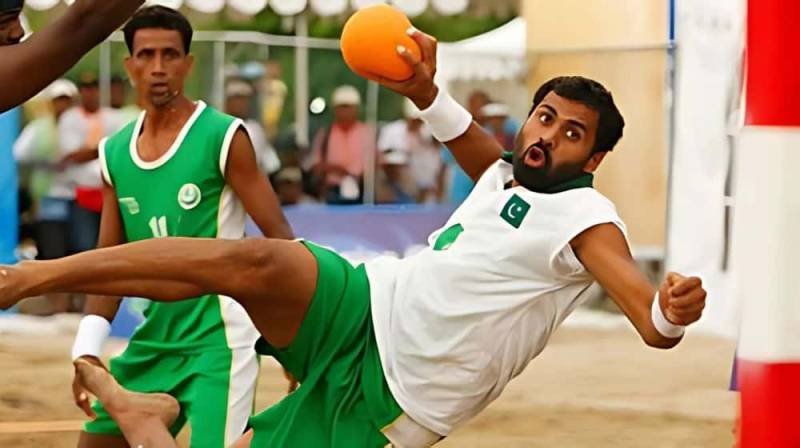Pakistan Navy Rescues Indian Sailor in Arabian Sea: A Remarkable Act of Humanity and Maritime Cooperation
In a powerful display of humanitarian spirit and maritime professionalism, the Pakistan Navy recently carried out a successful and compassionate rescue operation, saving the life of a critically injured Indian sailor aboard a Liberian oil tanker in the Arabian Sea. This extraordinary event has gained widespread recognition for showcasing Pakistan’s commitment to humanitarian values and peaceful cooperation in regional waters, beyond borders and political rivalries. Arabian
The Incident: Emergency in the Arabian Sea
The rescue mission began with an urgent distress call received by the Pakistan Navy from a Liberian-flagged oil tanker navigating the Arabian Sea. Onboard the vessel was a severely injured Indian sailor who required immediate medical attention. The exact nature of the injury has not been disclosed for privacy reasons, but it was classified as critical, demanding urgent intervention to prevent loss of life.
In such emergencies, time is everything. The Pakistan Navy immediately assessed the situation and mobilized a well-coordinated rescue response. It was a race against time in the open waters, and the Navy’s swift action undoubtedly made the difference between life and death. Arabian
Rapid Response: Helicopter and Naval Ship Deployed
Understanding the urgency of the call, the Pakistan Navy launched a dual-response mission—dispatching a naval ship as well as a helicopter equipped with a medical team. The air and sea operation demonstrated the Navy’s operational readiness and ability to respond to emergencies with precision. Arabian
Within a short span, the helicopter reached the oil tanker’s location, hovering over the vessel while the medical personnel were lowered onto the ship. The injured sailor was provided emergency first aid, stabilizing his condition on board. The professionalism and training of the naval medic al team played a critical role in ensuring that the sailor could endure the next steps of the operation .Arabian
Evacuation and Medical Transfer to Karachi
Once the sailor’s condition was sufficiently stabilized, he was safely airlifted from the tanker and flown directly to Karachi, where he was received by a team of doctors and emergency medical staff. Upon arrival, he was transferred to a medical facility for further treatment. Arabian
This quick and seamless evacuation underscores the Navy’s commitment not only to national security but also to humanitarian outreach. In situations involving lives at stake, the Pakistan Navy’s actions prove that it can rise to the occasion with both efficiency and compassion. Arabian
Humanity Beyond Borders
What makes this rescue even more remarkable is the identity of the sailor—an Indian national. Despite the longstanding political tensions between India and Pakistan, the Pakistan Navy responded purely on humanitarian grounds, without hesitation. Arabian
This act of rescuing a foreign national, especially from a country with which relations are often strained, sends a powerful message to the world: when it comes to saving lives, humanity comes first. Political borders may divide, but compassion unites. The Navy’s response was based on core humanitarian values that transcend race, nationality, and political differences. Arabian
Maritime Law and Moral Duty
Under international maritime law, particularly the United Nations Convention on the Law of the Sea (UNCLOS), nations have a duty to provide assistance to those in distress at sea, regardless of nationality or the flag state of the vessel. Pakistan, as a responsible maritime nation, fulfilled its obligations not just legally but morally as well.
However, the Navy’s actions went beyond legal duty—they reflected the deep-rooted culture of hospitality, care, and regional responsibility that the Pakistan Navy has developed over decades of maritime engagement.
Global Recognition and Diplomatic Impact
This humanitarian mission has earned praise from various quarters, including maritime organizations, human rights advocates, and peace-focused diplomats. International observers see the rescue not only as a life-saving operation but also as an opportunity to reduce hostilities and promote goodwill between neighboring countries. Arabian
Such gestures, though non-political in nature, carry enormous symbolic value. They can pave the way for better understanding, open new channels of communication, and soften perceptions between nations that are often locked in political or military rivalry. Arabian
Reputation as a Responsible Naval Force
This incident is not the first time the Pakistan Navy has stepped up in times of maritime crisis. Over the years, it has participated in numerous search and rescue (SAR) missions, anti-piracy operations, disaster relief efforts, and international joint naval exercises. Each operation has contributed to its growing reputation as a responsible and compassionate naval power in the region.
Through missions like these, the Pakistan Navy consistently demonstrates that its responsibilities go beyond defense and deterrence. It stands as a guardian of peace, a helper in times of trouble, and a force that values human life above all else. Arabian
US Lifts Ban on Student Visas with This New Rule
Read This Artical
Historical Precedents and Ongoing Efforts
The Pakistan Navy has a long history of such rescue missions. Whether assisting stranded fishermen, rescuing foreign crews in distress, or helping during natural disasters like tsunamis and floods, the Navy has always acted with a strong sense of duty and honor.
In 2017, the Navy rescued a Yemeni crew stranded at sea after their ship malfunctioned. In another case, it provided assistance to Iranian fishermen caught in a storm. These examples, among many others, form a pattern of behavior that reflects a policy of peaceful maritime engagement.
The Role of Naval Diplomacy
Naval diplomacy, also known as “soft naval power,” refers to using naval assets to foster goodwill, cooperation, and diplomacy rather than conflict. The rescue of the Indian sailor is a classic example of this concept in action.
Through such acts, the Pakistan Navy strengthens its image not just among international navies but also in the eyes of ordinary people across the globe. It fosters trust and builds relationships that might someday prove crucial in easing regional tensions Arabian.
Navies often represent their country’s values in international waters. The Pakistan Navy, through this and similar missions, sends a clear message: peace, compassion, and cooperation remain central to its operations Arabian.
Training and Preparedness: The Backbone of Success
The successful execution of this mission was possible due to the rigorous training and high preparedness level of the Pakistan Navy’s personnel. Emergency drills, rescue simulations, and regular maritime exercises ensure that every officer and sailor knows how to respond in crises.
The ability to quickly launch a helicopter-equipped medical team and coordinate it with a naval ship in open waters is no small feat. It requires coordination, discipline, and operational readiness that only a well-trained force can deliver Arabian.
Collaboration With Civilian Agencies
Another notable aspect of the mission was the smooth coordination with civilian medical authorities in Karachi. As soon as the sailor was airlifted, arrangements had already been made at a medical facility to ensure immediate treatment Arabian.
This cooperation between military and civilian agencies shows the strength of Pakistan’s emergency response infrastructure and reflects a broader national commitment to saving lives, whether on land or sea Arabian.
A Message to the Region and the World
While the rescue itself was local, the message it sends is global. In a world often torn apart by conflict, xenophobia, and political hostility, this mission reminds us of what humanity can achieve when compassion overrides division Arabian.
The Indian sailor’s survival is not just a personal victory—it is a symbol of what nations can do when they look beyond history and politics. It shows that even small acts of kindness on the high seas can ripple outward to promote peace and understanding on land Arabian.
Public Reaction and Media Coverage
News of the rescue has been met with admiration across social media and traditional news platforms. In Pakistan, citizens have expressed pride in their Navy’s professionalism and generosity. In India, many social media users thanked the Pakistan Navy for its humane gestur e Arabian.
Several international media outlets also highlighted the story, calling it a “ray of hope” in South Asia’s often tense atmosphere. Maritime journals and humanitarian organizations have likewise acknowledged the Navy’s action as a model for others to follow Arabian.
News of the rescue has been met with admiration across social media and traditional news platforms. In Pakistan, citizens have expressed pride in their Navy’s professionalism and generosity. In India, many social media users thanked the Pakistan Navy for its humane gestur e Arabian.
Several international media outlets also highlighted the story, calling it a “ray of hope” in South Asia’s often tense atmosphere. Maritime journals and humanitarian organizations have likewise acknowledged the Navy’s action as a model for others to follow Arabian.
Conclusion: Compassion Is the Greatest Power
The successful rescue of a critically injured Indian sailor by the Pakistan Navy is far more than a maritime operation. It is a beacon of hope, a message of peace, and a powerful reminder that compassion can still cut through the toughest of boundaries Arabian.
In a time when the world desperately needs more examples of unity, the Pakistan Navy has provided a real, tangible demonstration of what it means to serve humanity.
Let this mission be remembered not only for its professionalism but for the spirit it embodies—where saving a life becomes the greatest victory, and peace becomes the most powerful message .




